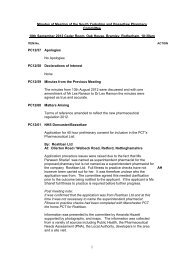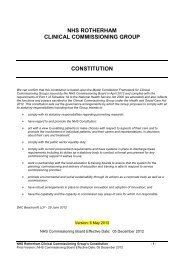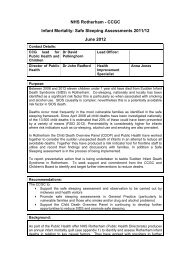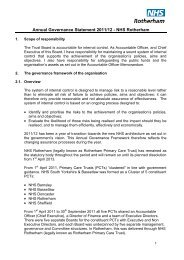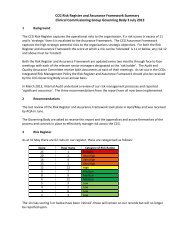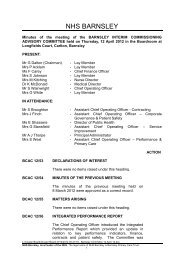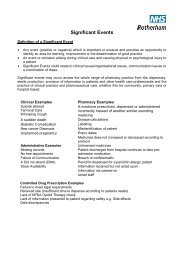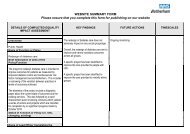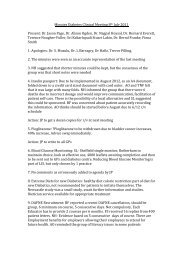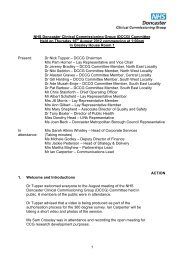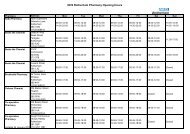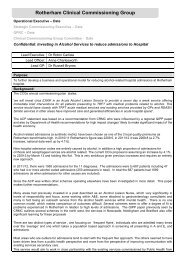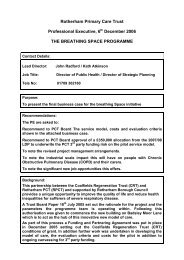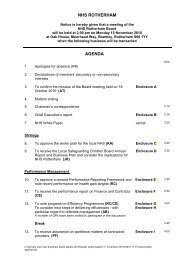Investment Planning and Management Process ... - NHS Rotherham
Investment Planning and Management Process ... - NHS Rotherham
Investment Planning and Management Process ... - NHS Rotherham
You also want an ePaper? Increase the reach of your titles
YUMPU automatically turns print PDFs into web optimized ePapers that Google loves.
Better Health,<br />
Better Lives<br />
<strong>Investment</strong> <strong>Planning</strong> <strong>and</strong> <strong>Management</strong> <strong>Process</strong>
Better Health,<br />
Better Lives<br />
<strong>Investment</strong> <strong>Planning</strong> <strong>and</strong> <strong>Management</strong> <strong>Process</strong>.. . . . . . . . . . . . . . . . . . . . . . . . . . . . . . . . . . . . . . 2
It is important that <strong>NHS</strong> <strong>Rotherham</strong> implements a clear <strong>and</strong> robust process for the management<br />
of changes to investment in health services. The following procedure should be followed for all<br />
investments <strong>and</strong> disinvestments, for example, Operational Plan proposals, major variations to contract.<br />
It is anticipated that all proposals put forward are in line with the delivery of Better Health, Better Lives.<br />
Once a need has been identified essentially we are looking at a four stage process, <strong>and</strong> all requests for<br />
funding <strong>and</strong>/or service variation should go via this process prior to submission to Board or Directors.<br />
Phase 1 – Submission of proposal<br />
An OP1 form (available from Lydia George) should be completed, which must be endorsed by the<br />
Programme Manager, or a Director where the proposal is not aligned to a programme area.<br />
Each proposal will be judged against the Board approved criteria (see annex A attached) which you<br />
should take into account when completing the OP1 form.<br />
The Programme Manager or, in the case of enabling proposals, a Director must approve all proposals<br />
prior to submission. It is also important that you seek finance support in completing the OP1 form.<br />
The completed OP1 form should be submitted to Lydia George <strong>and</strong> John Doherty who will check <strong>and</strong><br />
challenge the form for completeness <strong>and</strong> accuracy.<br />
Completion of Gateway 1<br />
The OP1 form has been satisfactorily completed in terms of completeness <strong>and</strong> accuracy <strong>and</strong> the<br />
scheme now moves to Phase 2 ‘evaluation <strong>and</strong> agreement to proceed’.<br />
Phase 2 – Evaluation <strong>and</strong> agreement to proceed<br />
The proposal, using the information provided on the submitted OP1 form, will be evaluated by the<br />
approvals panel <strong>and</strong> scored against the prioritisation criteria <strong>and</strong> a recommendation for<br />
approval / non-approval reached.<br />
Following prioritisation the approval process will be as follows:<br />
l Category 1 - Significant schemes over £250K will need Board approval<br />
l Category 2 - Recurrent schemes over £20K <strong>and</strong> non-recurrent schemes over £50K will need<br />
Commissioning Directors approval<br />
l Category 3 - Recurrent schemes up to £20K <strong>and</strong> non-recurrent schemes up to £50K will need<br />
approval from the Director of Strategic <strong>Planning</strong> <strong>and</strong> the Director of Finance<br />
Once a scheme has completed the approval process Lydia George will inform the Programme Manager<br />
via e-mail (c.c. to John Doherty) of the outcome. At this stage the funding allocation is indicative <strong>and</strong><br />
Programme Managers will be expected to firm up these costs before the scheme start date.<br />
Completion of Gateway 2<br />
The scheme has received agreement to proceed <strong>and</strong> moves to Phase 3 ‘Procurement, contracting,<br />
mobilisation or de-mobilisation’.<br />
<strong>Investment</strong> <strong>Planning</strong> <strong>and</strong> <strong>Management</strong> <strong>Process</strong>.. . . . . . . . . . . . . . . . . . . . . . . . . . . . . . . . . . . . . . 3
Phase 3 – Procurement process, contracting, mobilisation or de-mobilisation<br />
Once a scheme has successfully completed gateway 2 <strong>and</strong> has received agreement to proceed the<br />
transfer of responsibility for the resource will go to the Programme Manager <strong>and</strong> will be held in a ‘virtual’<br />
budget until the scheme has commenced <strong>and</strong> the costs are confirmed. Schemes costing more than<br />
requested in the proposal will need to be discussed at the earliest opportunity, where schemes come in<br />
at less than the proposal then the surplus will be returned to the Operational Plan central budget. This<br />
will be important from 2009 onwards where the list of proposals exceed the funding available.<br />
The Programme Manager is responsible for ensuring the mobilisation or de-mobilisation of the scheme<br />
<strong>and</strong> of confirming the start date <strong>and</strong> actual costs.<br />
Requests for additional funding must be made via the Programme Manager <strong>and</strong> it should be noted that<br />
the resource allocated is for the purpose of the original bid <strong>and</strong> cannot be used for alternative schemes<br />
/ outcomes. Very minor deviations are acceptable but if in doubt clarification should be sought to avoid<br />
the risk of funding being withheld.<br />
Completion of Gateway 3<br />
The scheme is successfully mobilised or de-mobilised, contracts are signed <strong>and</strong> the costs <strong>and</strong> scheme<br />
start dates have been confirmed <strong>and</strong> funding has been transferred into the appropriate budgets.<br />
Scheme now moves into Phase 4 ‘monitoring <strong>and</strong> evaluation’.<br />
Phase 4 - Monitoring <strong>and</strong> Evaluation<br />
The scheme is now live <strong>and</strong> progress will be monitored jointly by the Programme Manager <strong>and</strong> Contract<br />
Manager. Regular updates will be reported to Lydia George who will keep a central control over the<br />
<strong>Investment</strong> Plan <strong>and</strong> will arrange for regular updates to Commissioning Directors.<br />
It will be expected that the evaluation, as set out in the OP1 form, will take place <strong>and</strong> be reported to<br />
ensure performance <strong>and</strong> value for money.<br />
Completion of Gateway 4<br />
The scheme is now live <strong>and</strong> included within routine performance management.<br />
Approvals panel consists of: Kath Atkinson, Chris Edwards, Public Health representative<br />
Supported by: John Doherty <strong>and</strong> Lydia George.<br />
Note: under exceptional circumstances if the approval process gets out of sync i.e. a proposal receives Board<br />
or Commissioning Directors approval prior to the submission of the OP1 form it is imperative that the form is still<br />
completed <strong>and</strong> submitted as this is the only way that the funding can be identified <strong>and</strong> allocated.<br />
Better Health,<br />
Better Lives<br />
<strong>Investment</strong> <strong>Planning</strong> <strong>and</strong> <strong>Management</strong> <strong>Process</strong>.. . . . . . . . . . . . . . . . . . . . . . . . . . . . . . . . . . . . . . 4
INVESTMENT PROCESS FLOW CHART<br />
Need identified<br />
Phase 1<br />
Submission of proposal<br />
Completion of Gateway 1<br />
OP1 form has been satisfactorily completed in terms of completeness <strong>and</strong> accuracy<br />
Phase 2<br />
Scheme is evaluated, scored against criteria <strong>and</strong> approval route is dependant on the category of the<br />
proposal (1,2 or 3)<br />
Category 1<br />
Over £250K = Board approval.<br />
Category 2<br />
Recurrent over £20K or<br />
non-recurrent over £50K =<br />
Commissioning Directors<br />
approval.<br />
Category 3<br />
Recurrent under £20K or nonrecurrent<br />
under £50K = approval<br />
of Strategic <strong>Planning</strong> <strong>and</strong> Finance<br />
Directors.<br />
DECISION<br />
Proposal not supported<br />
Programme Manager will be informed<br />
of the decision<br />
Completion of Gateway 2<br />
Scheme receives agreement to proceed, based<br />
on indicative costs provided. Programme<br />
Manager holds the ‘virtual’ budget.<br />
Phase 3<br />
Scheme now has indicative funding <strong>and</strong> enters the phase of procurement, contracting, mobilisation<br />
or de-mobilisation, confirmation of costs <strong>and</strong> start date.<br />
Completion of Gateway 3<br />
Scheme is successfully mobilised or de-mobilised, contracts are signed, the costs <strong>and</strong> scheme start<br />
dates are confirmed <strong>and</strong> funding is transferred to appropriate budget.<br />
Phase 4<br />
Scheme is now live <strong>and</strong> progress will be monitored <strong>and</strong> evaluated by the Programme<br />
Manager <strong>and</strong> Contract Manager.<br />
Completion of Gateway 4<br />
Scheme is now live <strong>and</strong> included within routine performance management.<br />
<strong>Investment</strong> <strong>Planning</strong> <strong>and</strong> <strong>Management</strong> <strong>Process</strong>.. . . . . . . . . . . . . . . . . . . . . . . . . . . . . . . . . . . . . . 5
<strong>NHS</strong> <strong>Rotherham</strong> Prioritisation Framework<br />
To be a World Class Commissioner <strong>NHS</strong>R needs to have robust processes for prioritising investment to improve<br />
population health (WCC competency 6.1).<br />
Currently there are at least five situations where prioritisation decisions are made:<br />
1. Individual case decisions (currently the Effective And Appropriate Health Care document is used as part of the<br />
<strong>Process</strong> for making purchasing decisions for out of contract or restricted services– this is awaiting revision when new<br />
national guidelines are issued later in the year)<br />
2. PBC business case approval (uses a proforma with 10 criteria relating to prioritisation, deliverability <strong>and</strong> governance)<br />
3. PCT Business cases – no framework – either Board Decision or delegated to Chief Executive with no explicit<br />
framework.<br />
4. PCT existing spending – no explicit framework or process<br />
5. Specialised commissioning decisions - currently use draft Barnsley criteria (5 very general criteria)<br />
This paper is mainly concerned with PCT Business cases but similar principles should be applied in the other situations,<br />
in particular there is little difference in principle between new spending <strong>and</strong> existing spending. The criteria as agreed<br />
following a review of other PCT prioritisation frameworks.<br />
Prioritisation Criteria<br />
1. Evidence of need<br />
l Number of people with capacity to benefit<br />
l Quality <strong>and</strong> capacity of existing services<br />
l <strong>Rotherham</strong>’s comparative outcomes in this area<br />
2. Health impact<br />
l Strength of evidence that the proposal will bring about health gain -hierarchy of evidence from authoritative national<br />
guidance (e.g. NICE), high quality r<strong>and</strong>omised controlled trials to other evidence.<br />
l Amount of health gain in terms of extending life or increasing quality of life.<br />
3. Impact on health inequalities<br />
l Impact on health inequalities within <strong>Rotherham</strong>.<br />
l Impact on health inequalities between <strong>Rotherham</strong> <strong>and</strong> the national average<br />
4. Cost <strong>and</strong> cost effectiveness<br />
l Total cost of proposal.<br />
l Relationship between cost <strong>and</strong> health impact - ideally in terms of cost per QALY or life years.<br />
5. Affordability <strong>and</strong> timing<br />
l Overall cost in relationship to spend on this programme area <strong>and</strong> total <strong>NHS</strong>R spend.<br />
l Timing of the spend <strong>and</strong> timing of benefits.<br />
6. Public opinion<br />
l Evidence of dem<strong>and</strong> <strong>and</strong> acceptability<br />
7. Fit with strategy<br />
l National policy<br />
l <strong>NHS</strong>R Strategic plan, Better health, Better lives<br />
l Partners strategy e.g. RMBC.<br />
For further information or if you have any questions about the process please contact:<br />
Lydia George, ext 2116 or e-mail: Lydia.george@rotherhampct.nhs.uk or<br />
John Doherty, ext 2029 or e-mail: john.doherty@rotherhampct.nhs.uk<br />
Better Health,<br />
Better Lives<br />
<strong>Investment</strong> <strong>Planning</strong> <strong>and</strong> <strong>Management</strong> <strong>Process</strong>.. . . . . . . . . . . . . . . . . . . . . . . . . . . . . . . . . . . . . . 6
<strong>Investment</strong> <strong>Planning</strong> <strong>and</strong> <strong>Management</strong> <strong>Process</strong>.. . . . . . . . . . . . . . . . . . . . . . . . . . . . . . . . . . . . . . 7
Date of publication: 25.06.2009<br />
Ref: 1494_0910<strong>NHS</strong>R<br />
© Creative Media Services <strong>NHS</strong> <strong>Rotherham</strong><br />
<strong>NHS</strong> <strong>Rotherham</strong> is the <strong>Rotherham</strong> Primary Care Trust



